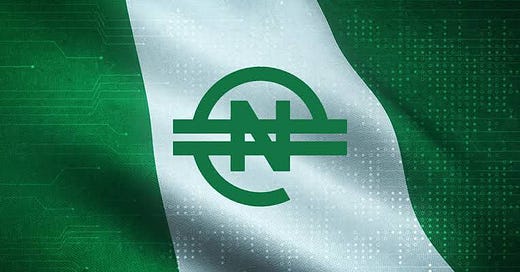E-Naira, E for ??
In 2021, Nigeria launched Africa’s first digital currency. The E-naira is a central bank digital currency backed by law, the full sovereignty of Nigeria, issued by the Central Bank of Nigeria (CBN) as a legal nd a unit of account. Some reasons for the adoption of this digital currency by the Central bank were increased financial inclusion (Meffy’s favourite mantra) because the e-naira targeted people who did not have bank accounts but owned phones, and facilitation of remittances. After all, it was to provide frictional transactions, reduce the costs of transfers, and reduce informality - Nigeria has a large informal sector and the e-naira sort to move households and businesses operating in that sector to the formal thereby making transactions traceable and data readily accessible.
Last week, the IMF released a working paper on how effective this digital currency has been and the reports were not good. The report showed that adoption by households and merchants has been slow. Although the number of days to reach 500,000 downloads was less, the move to 600,000 downloads took more than double the days for the first milestone and since then, downloads have been crawling. Also, the weekly transactions from 2021 to date have not experienced significant increases, we've also seen a decline in downloads by merchant users after the launch of the app. Most importantly it was noted that 98.5% of accounts created have been left dormant by users who set up these accounts.
So what?
A serious case of what was ordered versus what was gotten. In the “theoretical sense”, a design of an electronic currency that caters to a population that has wide phone coverage but fewer registered bank accounts should bridge the gap for financial inclusion but this is not seen as the effect of the launch.
With mobile bank platforms still available and USSD options for the informal sector, it is a bit difficult trying to enter the market and gain a high level of dominance with the presence of options, although the e-naira should be perceived as being central and possibly mandatory. A possible solution would be increased awareness of the possibilities made available with the e-wallet, and emphasise easy linkage with already set up bank accounts so users make more use of the E-Naira platform. But would increased usage of the e-naira platform lead to a decreased usage of mobile banking platforms, are these platforms mutually exclusive?
Zoom out, the topic of financial inclusion is one that the current Central Bank Governor has emphasised consistently in his tenure and has subsequently pushed out policies that increase financial inclusion in the Nigerian economy. But the effect of these policies has not entirely captured the heart of the problem. Systems and structures need to be in place that hold up these policies to efficiently function. Awareness needs to be created and provisions for poverty alleviation should be made because although these points do not directly affect the financial policies, they indirectly make or break its effectiveness.




